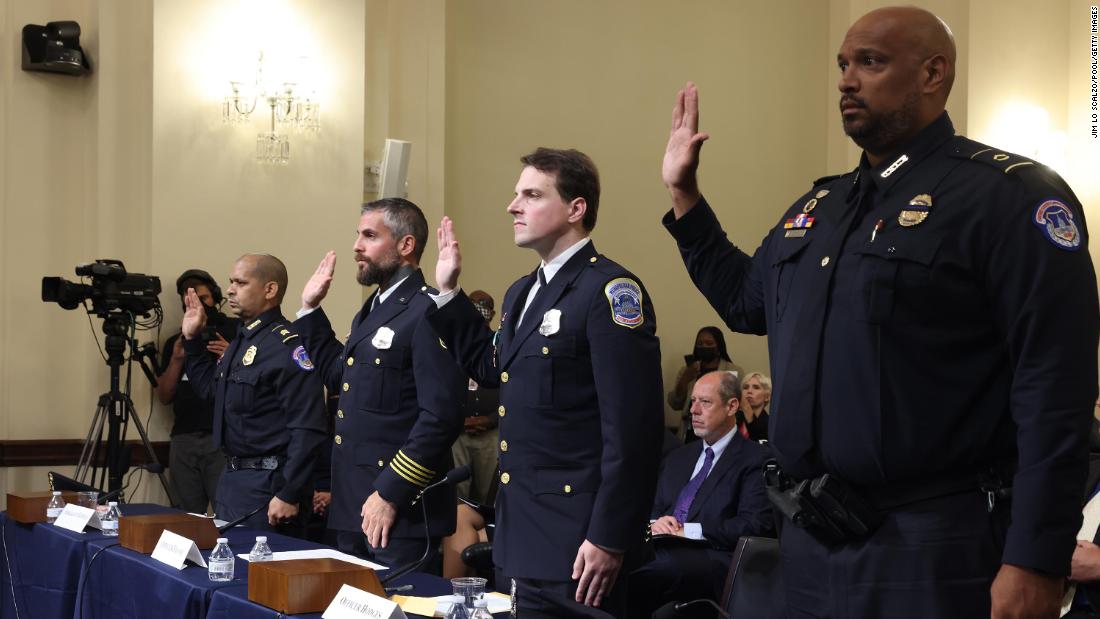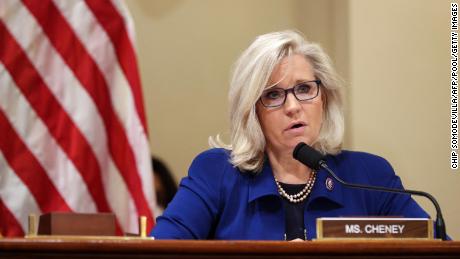Five takeaways from officer testimony at the first Jan. 6 hearing
The three-hour hearing was the opening act for the committee that’s preparing to investigate all of the circumstances surrounding the January 6 insurrection, including the role played by former President Donald Trump. But the first hearing was focused squarely on the violence officers faced at the hands of a mob of Trump supporters.
One by one, the four officers who testified Tuesday — DC Metropolitan Police Officers Daniel Hodges and Michael Fanone, and Capitol Police Officer Harry Dunn and Sgt. Aquilino Gonell — recounted their gut-wrenching stories about how they were attacked and their lives were threatened on January 6.
“I was at risk of being stripped of and killed with my own firearm as I heard chants of ‘kill him with his own gun,'” Fanone said. “I can still hear those words in my head today.”
Dunn’s testimony included detailing pro-Trump supporters hurled racial epithets at him, calling him the n-word, something he said he had never experienced while wearing his police uniform. He described afterward how he sat down with another black officer “and told him about the racial slurs I endured.”
“I became very emotional and began yelling, ‘How the blank could something like this happen? Is this America?'” Dunn said.
Gonell, who served in Iraq, said he was more afraid working at the Capitol on January 6 than at any point in serving a war zone. “I remember thinking to myself, this is how I am going to die, defending this entrance,” said Gonell, who couldn’t hug his wife when he returned home the following morning because he was covered in chemical spray.
The gripping testimony hit home the point, over and over again, about just how violent the January 6 attack on the Capitol really was even as the insurrection has become a political fight in the months that have followed.
This was no tourist visit
Trump, in an interview with The Washington Post reporters Philip Rucker and Carol Leonnig for their book released this month, said it was a “loving crowd” on January 6.
Tuesday’s testimony sliced through those efforts to whitewash the events of January 6. The body-cam footage was violent and hard to watch.
The officers said the rioters they fought against were terrorists. Woven into the stories about how they and their colleagues were attacked — and in some cases badly injured — the officers expressed outrage that the violence launched by pro-Trump supporters was being ignored by the very lawmakers they protected that day.
“I feel like I went to hell and back to protect them and the people in this room. But too many are now telling me that hell doesn’t exist, or that hell wasn’t actually that bad,” Fanone said.
“The indifference shown to my colleagues is disgraceful!” Fanone continued, raising his voice and slamming his fist on the table in one of the most powerful moments of the hearing.
“It’s upsetting. It’s a pathetic excuse for his behavior for something that he himself helped to create this monstrosity,” Gonell said. “I’m still recovering from those hugs and kisses that day, that he claimed that so many rioters, terrorists, were assaulting us that day.”
The select committee is going after Trump
Outside of Cheney’s questions, the select committee didn’t turn much of its opening hearing on Trump’s role in the January 6 insurrection, focusing on the rioters who attacked the Capitol and the officers protecting it.
But it’s clear that’s where the committee is headed.
“We must also know what happened every minute of that day in the White House — every phone call, every conversation, every meeting leading up to, during, and after the attack,” she said. “If those responsible are not held accountable, and if Congress does not act responsibly, this will remain a cancer on our constitutional republic, undermining the peaceful transfer of power at the heart of our democratic system.”
It still remains to be seen whether Trump, his former aides or his allies in Congress will actually testify — his White House has defied congressional subpoenas before — but the select committee is already signaling it’s going to try.
Trump allies are on the outside looking in
House Democrats have held numerous high-profile hearings over the past several years aimed at the former President, from the testimony of former special counsel Robert Mueller to the impeachment proceedings over Trump’s efforts to pressure Ukraine to investigate Joe Biden.
This was the first time none of Trump’s allies could offer up a defense of the former president.
“We still don’t know exactly what happened. Why? Because many in my party have treated this as just another partisan fight,” Kinzinger said. “It’s toxic, and it’s a disservice to the officers and their families, to the staff and employees on the Capitol Complex, and to the American people who deserve the truth.”
The impact of January 6 goes well beyond politics
The creation the select committee to investigate January 6 has been swept up in a political fight for months now over how the January 6 insurrection should be investigated. The committee’s work will undoubtedly delve into the political realm as it examines the role of Trump and the reasons the pro-Trump supporters descended on the Capitol, attacked officers and tried to stop the certification of Biden’s November election victory.
The officers’ testifying on Tuesday became emotional at multiple points as they recounted their stories and expressed raw frustration about how lawmakers they protect at the Capitol have tried to downplay or ignore what happened.
“It’s indescribable. You’re defending the indefensible,” Gonell said of those lawmakers defending the insurrectionists. “It demoralizes not just the rank-and-file but the future recruits. What do you think people considering becoming law enforcement officers think when they see elected leaders downplaying this. Why would I risk my life for them, when they don’t even care?”
In his testimony, Dunn acknowledged the mental toll the January 6 attack had on many officers, saying he’s sought counseling and making a plea to his colleagues to be unafraid do the same.
“More than six months later, January 6 still isn’t over for me,” Dunn said. “I know so many other officers continue to hurt, both physically and emotionally. … What we went through that day was traumatic, and if you’re hurting, please take advantage of the counseling services available to us.”
CNN’s Annie Grayer, Clare Foran and Lauren Fox contributed to this report.
![]()




